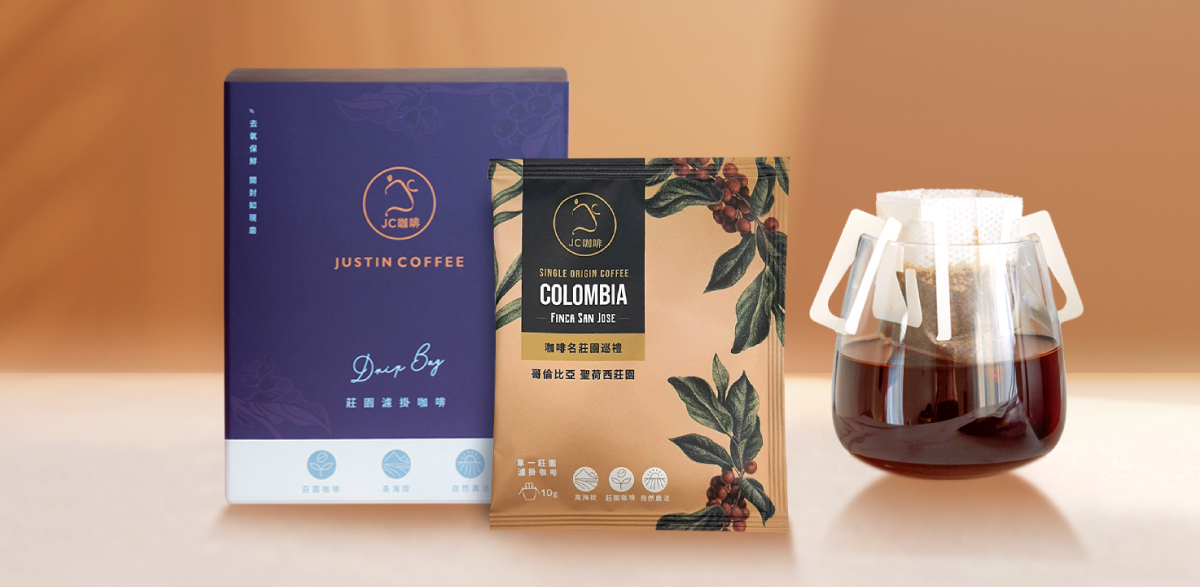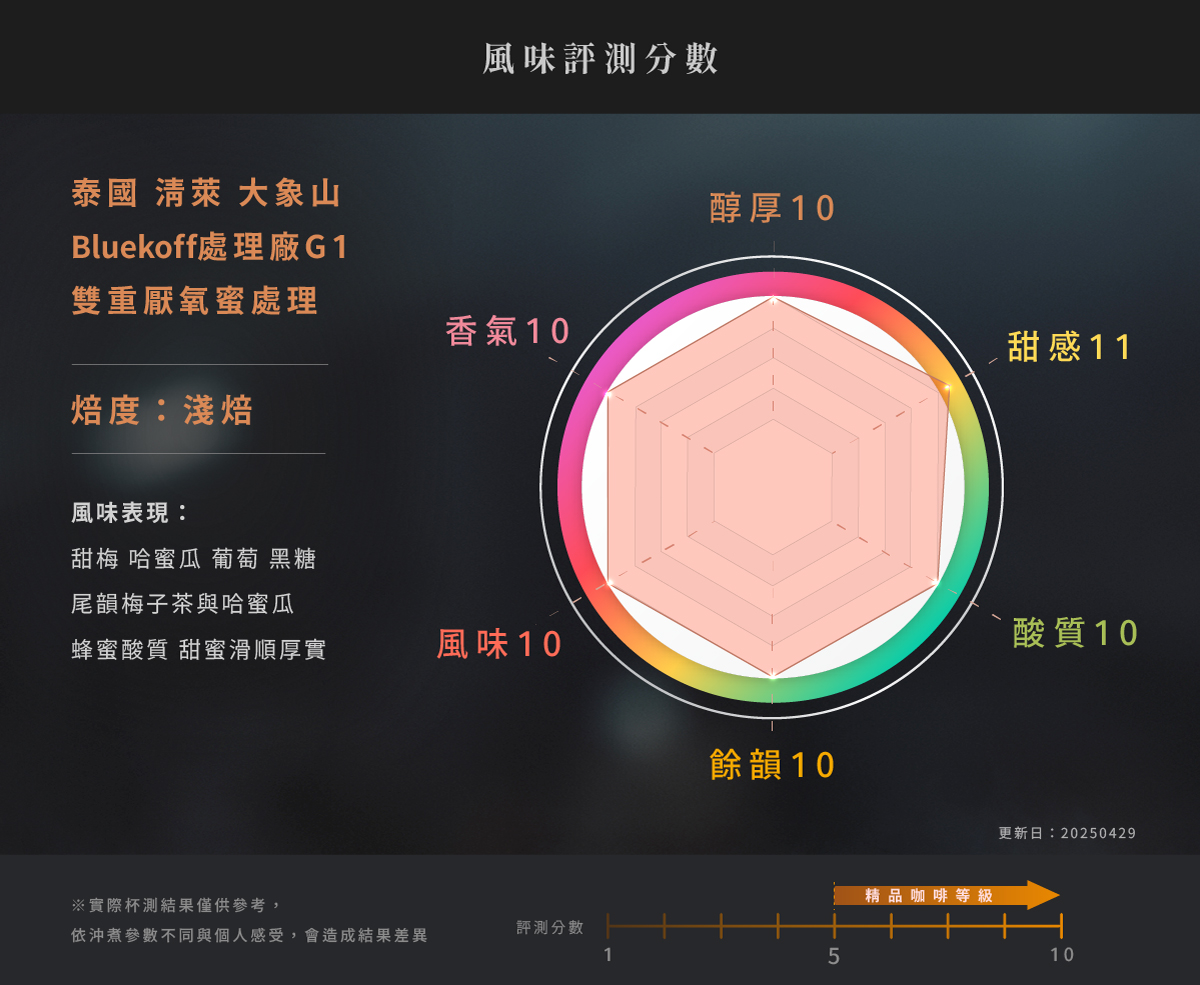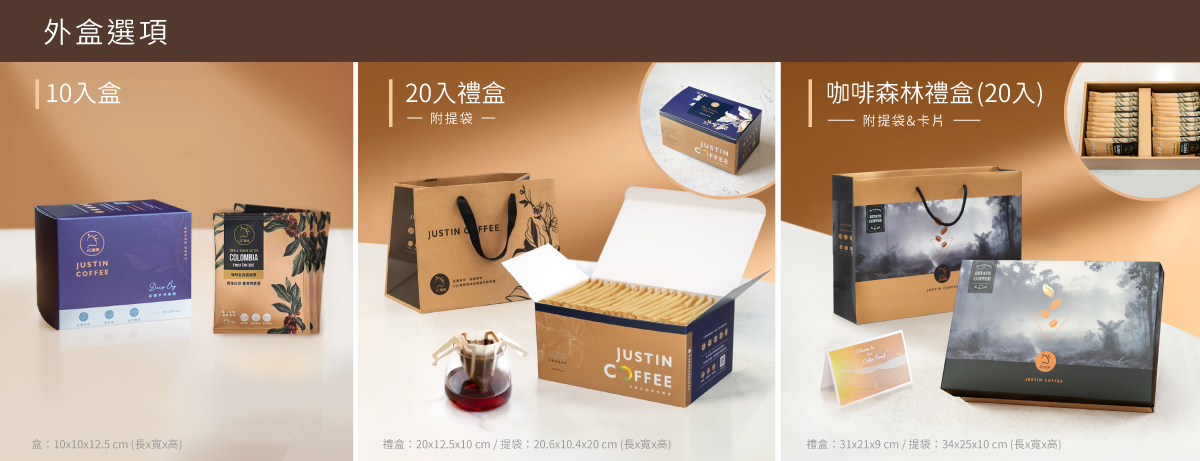
➤ Freshly Roasted Specialty Coffee Shop
➤ Quality Assured by CQI-Certified Coffee Graders
➤ Million-Grade Coffee Sorting Machine for Defect Removal
➤ Deoxygenated Preservation for Freshness

│Coffee Estate Experience- Monthly Special
Thai Chiang Rai Doi Chang
Hailing from one of Thailand's most iconic coffee-producing regions, Doi Chang upholds natural farming methods and traditional craftsmanship. This dedication yields Arabica coffee of consistent quality and unique flavor. Cultivated at altitudes ranging from 1,200 to 1,500 meters, where cool climates and fertile soil prevail, this coffee is a remarkable creation known for its rich flavor and abundant sweetness.
This coffee is robust and delicious, offering a delightful sweetness. You'll find bright notes of sweet plum and cantaloupe in the initial taste, transitioning to grape and brown sugar in the mid-palate. The finish is reminiscent of plum tea and cantaloupe, leaving a sweet, smooth, and full-bodied impression.
----------
Coffee Information:
Single Estate Drip Bag Coffee – Colombia San Jose Estate Rum Barrel Washed


※ Coffee Forest Gift Box & 20-Pack Gift Box include a gift bag
(For the 10-Pack Box, a gift bag is available as an add-on ► Optional Purchase)
※ Note: A maximum of 5 boxes can be picked up at convenience stores. Additional items cannot be included in the same order.







Coffee Flavor
The flavors of coffee are derived from the breakdown of various nutrients in the green coffee beans during roasting. Heat causes these compounds to degrade into a variety of aromatic molecular structures, resulting in a wide spectrum of flavors. High-quality coffee beans naturally possess a rich aroma that evolves at different temperatures—high, medium, and low—offering a delightful and nuanced experience worth savoring.
Thai Chiang Rai Bluekoff G1 Anaerobic Honey
Sweet plum, cantaloupe, grape, brown sugar. The finish reveals notes of plum tea and cantaloupe, with honeyed acidity, culminating in a sweet, smooth, and full-bodied experience.

Thai Chiang Rai Doi Chang Coffee
Thai Chiang Rai Doi Chang Coffee is committed to natural cultivation and traditional processing, making it one of Thailand's most renowned coffee products. Doi Chang, located in Chiang Rai Province in northern Thailand, is one of the country’s most famous coffee-growing regions. With an altitude of approximately 1,200 to 1,500 meters, it boasts fertile soil and an ideal climate for cultivating Arabica coffee beans. The coffee industry in this region operates under a cooperative model between local businesses and villagers, forming a complete supply chain from production to sales.
Doi Chang coffee is meticulously handpicked, ensuring only fully ripe red cherries are selected. After harvesting, the cherries undergo a washed fermentation process, enhancing the coffee’s clarity and well-defined flavor profile. The beans are then sun-dried—a slower process compared to mechanical drying but one that better preserves the coffee’s natural aromas.
The harvest season runs from November to January, during which farmers carefully turn and dry the beans to ensure uniform moisture levels and consistent quality. Known for its distinctive flavor and premium quality, Doi Chang Coffee has become one of Thailand’s most celebrated coffee brands.
Doi Chang, located in Thailand’s Golden Triangle region, was not always known for coffee. In the past, the area was infamous for opium cultivation and trade, with many farmers relying on this cash crop to sustain their livelihoods. In 1983, with the support of a royal initiative, farmers began planting Arabica coffee trees. Northern Thailand’s fertile soil and cool climate provided optimal conditions for coffee cultivation, allowing the industry to thrive.
After over 20 years of coffee farming, Doi Chang’s farmers grew frustrated with being dependent on third-party coffee traders. In response, they established their own cooperative—comprising thousands of smallholder farmers—to sell coffee directly. They named it Doi Chaang Coffee (with two “a”s in "Chaang" as part of the organization’s official branding). Most of Doi Chang’s coffee is grown on small family-owned farms, where farmers meticulously care for their coffee trees to produce the highest-quality single-origin coffee.
Thailand’s coffee processing facilities have also advanced beyond expectations. From initial floating bean sorting to vibration-based defect screening, de-pulping, fermentation, and large-scale mechanical drying, the entire process is built seamlessly along the mountainside. This well-integrated system reduces labor requirements while ensuring consistent and stable coffee quality.
---------------------------
Thai Chiang Rai Bluekoff Processing Station
This brand was founded by Ah-Supachai Srivittaporn, the first president of the Specialty Coffee Association (SCA) in Thailand. In the beginning, the brand relied on others for coffee roasting and distributed the products to local cafés through Bluekoff. Gradually, they began sourcing green coffee beans from various regions and started their own roasting business. One day, Ah realized that in order to maintain consistently high coffee quality, it was essential to control the process from the very beginning — at the source. This vision led to the establishment of the Bluekoff Processing Station in Doi Chang.
During every coffee harvest season, Ah personally travels to the mountains to oversee and manage every stage of green bean processing — from depulping the cherries, fermentation, washing, to drying. Before the coffee beans are transported to the city for roasting, they must go through polishing, sorting by size and weight, and careful selection to ensure only the highest quality beans are chosen for roasting.

The coffee tree, botanically classified under the Rubiaceae family and the Coffea subgenus, is an evergreen tree. Coffee beans are the seeds of the coffee fruit. There are three main varieties: Arabica, Robusta, and Liberica. These three varieties cannot crossbreed to produce different subspecies. The world’s specialty coffee comes from the Arabica variety, and within Arabica, there are various subspecies resulting from evolution, hybridization, and mutation.
Arabica Coffee Variety: Catimor
Catimor is a coffee variety resulting from the hybridization of Caturra and Timor Hybrid. The Timor Hybrid itself is a natural cross between Coffea arabica and Coffea canephora (Robusta), which means Catimor inherits Robusta’s genetic traits, including exceptional resistance to coffee leaf rust. This resistance has made Catimor highly popular in regions affected by leaf rust, particularly in Central and South America.
Catimor coffee trees grow as small shrubs, with compact, tea-like leaves and a canopy that naturally protects the trunk, reducing susceptibility to pests and diseases. As an early-maturing variety, Catimor boasts higher yields than many commercial coffee varieties. However, due to its high productivity, proper fertilization and shade management are essential for maintaining plant health.
The coffee beans of Catimor are small and round, with a caffeine content ranging from 1% to 2%. When grown at lower altitudes, the flavor profile may be somewhat mild. However, when cultivated at 1,200 meters or higher, Catimor’s quality improves significantly, with a cup profile that can even rival Bourbon and Caturra varieties.
Although Catimor may not always compete with the finest Arabica varieties in terms of flavor, its disease resistance, high yield, and adaptability to lower altitudes make it an indispensable part of the global coffee industry. With advancements in processing techniques and roasting methods, some carefully cultivated Catimor varieties are now revealing more refined and complex flavors, offering exciting potential for coffee enthusiasts to explore and appreciate.
 (Coffee Processes)
(Coffee Processes)
The term "processing methods" refers to the process of transforming ripe red coffee cherries into dried green beans. Each method has its advantages and disadvantages, influenced by the natural environment and the specific needs of the coffee-producing region. As a result, different regions adopt the processing method most suited to their conditions. This batch uses the following Barrel Aging processing methods, described below:
【Double Anaerobic Honey Process】
For this batch of Double Anaerobic Honey Process, Bluekoff Processing Station was specially commissioned to process the coffee cherries using a nearly fully automated mechanical system. During the first two days of fermentation, the cherries are covered with tarpaulin to create an almost oxygen-free environment, allowing them to ferment anaerobically until the ideal pH level is reached.
After achieving the desired pH, the cherries are depulped and inoculated with food-grade yeast, then undergo a second anaerobic fermentation in large stainless steel tanks for another two days.
Following fermentation, the beans are mechanically dried using industrial dryers until they reach a moisture content of approximately 10.5%, ensuring the stability of the unique fermentation profile.
At this stage, the parchment coffee is stored in a specially designed storage facility to preserve the quality and freshness of the green beans. Before final hulling, the beans are carefully sorted again using a color sorter, ensuring only the finest beans are bagged and shipped.



JUSTIN INTERNATIONAL FOOD ENTERPRISE CO., LTD.
Tel: +886-3-358-6611
1st Floor, No. 30, Lane 120, Daxing Road, Taoyuan District, Taoyuan City
▶This product is covered by a NT$10 million product liability insurance.
▶Food Industry Registration Number: F-165601955-00000-0
▶ Our company’s cupper is certified as a CQI International Coffee Quality Appraiser.



Recommended Products

※ Note: A maximum of 3 boxes can be picked up at convenience stores.Additional items cannot be included in the same order. For orders of 4 boxes or more, please choose home delivery.
※ For detailed shipping and payment information, invoices, overseas ordering instructions, etc., please click here to enter.
